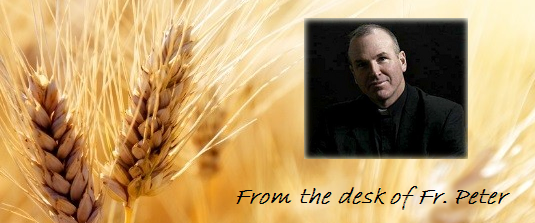Peace to you! I thought you might enjoy something from my friend Fr. Boly.
What is prayer? Prayer is awareness of God, engagement with God, abandonment to God. Prayer is as natural as breathing, as spontaneous as wonder. Prayer is holding your breath at the beauty of fall leaves, is breaking your heart at the pain of a child. Prayer begins when God’s Spirit lifts your mind and heart to pay attention to the Divine Majesty.
All three scripture readings today deal with the attitude of insistence and persistence. In the reading from Exodus, Moses trusts God even when attacked by a superior army. Aaron and Hur help Moses keep his drooping hands aloft to assure Israel’s victory against Amalek. This is persistence.
In the second reading, Paul urges his young disciple Timothy to learn and proclaim the good news both when it is convenient and inconvenient. What does insistence in learning mean today? It means educating ourselves in practical wisdom about current issues. October is the month dedicated to our prophetic witness to the sanctity of life. This is a good season to refresh our understanding of the entire range of life issues.
In the gospel, Luke’s community had a question. When will the Risen Jesus return to establish the final reign of God? In response to the question, Jesus assures his hearers that it is necessary to persist in prayer and never give up hope that justice will prevail over unfairness. He then tells the parable about the widow and the unjust judge.
Luke introduces the parable with an editorial explanation so that everyone will be clear about meaning of the parable. He says that constant prayer and confidence in God’s promises are necessary in the spiritual life.
The story unfolds about two figures. One is a widow, among the most vulnerable in society, who has been wronged and seeks justice.
The other is a judge, powerful and respected. Jewish law obligates him to protect “widows and orphans” in a special way. The judge refuses to do his job, proclaiming neither respect for God nor for the community.
It is only when the widow continues to bother him and threatens his status that he relents. The message is clear. Just as the widow is persistent, so also are God’s chosen ones to beseech God and to await God’s justice. The time of justice is coming even though it seems delayed.
When people are treated unfairly, they are tempted to take the law into their own hands and retaliate against violators of their respectability. Jesus teaches his followers to turn the other cheek, to pray for those who persecute them. The role of disciples is to treat oppressors with kindness, and to trust that the role of God is to punish the defilers of justice in God’s mysterious way – by allowing the violent to suffer the consequences of their violence (Gen. 9.6; Exodus 21:12; Mt. 26.52).
Today’s readings urge patience and persistence in dealing with injustice. Patience and persistence. They seem to be at odds with one another. The first requires what seems like inactivity. The other involves active insistence, a holy indignation at inaction. For the Christian the message is this: Wait for God. But don’t stop asking or trusting God. God always will give you what you need for your journey home to God.
It is difficult to understand how you and I can persevere in prayer so that prayer becomes unceasing. One suggestion is the traditional prayer called “The Jesus Prayer.” You pray the phrase, “Lord Jesus, Son of the Living God” while inhaling a breath. And then you pray the phrase “have mercy on me” while exhaling.
In this form of prayer, inhale the sacred name of Jesus and exhale a plea for mercy. At first, begin by sitting quietly and concentrating on your breathing. When you are persistent, every breath will become a prayer and every moment of life – when while sleeping – an offering of praise.
What does it mean for us to be stewards of prayer? It means to embrace our identity as contemplatives in action. Pray for the grace “to be contemplatives in action.” Fr. Craig Boly, S.J.

